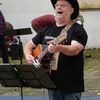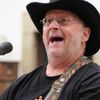Singer/ Songwriter
Ballad of Joking Jesus
I’m the queerest young fellow that ever you heard
My mother’s a Jew, my father’s a bird.
With Joseph the Joiner I cannot agree
So here’s to disciples and Calvary.
If anyone things thinks that I amn’t divine
He’ll get no free drinks when I’m making the wine
But have to drink water and wish it were plain
That I make when the wine becomes water again.
Goodbye, now, goodbye! Write down all that I said
And tell Tom, Dick, and Harry I rose from the dead.
What’s bred in the bone cannot fail me to fly
And Olivet’s breezy… Goodbye, now, goodbye!
Lyrics: James Joyce ( in "Ulysses")
Die Ballade vom lustigen Jesus
Ein seltsamer Bursche muss ich schon sein,
Ein Vogel war der Vater mein
‘ne Jüdin fein mein Mütterlein.
Und Joseph, der Tischler, war nie mein Papa,
Es leben die Jünger und Golgatha!
Wer zweifelt an meinem göttlichen Sein,
Der soll nicht frei saufen, wenn ich zaubre den Wein.
Nur Wasser bekommt er, sein Trank soll es sein,
wenn in Wasser ich wieder
Verwandle den Wein.
Und nun lebet wohl!
Was ich sagt’, schreib fein nieder,
Verkündet auch allen,
Dass zum Himmel ich wieder
Jetzt fliege durch Kraft, die ich finde
In mir. Des Ölbergs Winde
Sind kalt. Lebet wohl!
(Joyce, Ulysses)
"What Stephen calls "The ballad of joking Jesus" is an only slightly retouched excerpt of a poem written by Oliver Gogarty, called The Song of the Cheerful (but slightly sarcastic) Jesus. Joyce's small revisions make the poem still funnier.
Gogarty apparently wrote his poem only after Joyce had moved out of the tower. He sent it to Joyce for Christmas 1904, and Ellmann speculates that his gift was meant as a peace offering after their fall break-up. Joyce reciprocated the sentiment, it would seem, when he took parts of this satirical poem and put them in Mulligan's mouth on the morning of June 16, forming the comical high point of Telemachus. Ellmann reproduces Gogarty's poem in its entirety (206), making it easy to judge how Joyce presented it.
In Telemachus, Mulligan recites stanzas 1, 2, and 9 of the poem’s nine quatrains, the last of these being somewhat revised from the original. Of these editorial choices, it may be said that Joyce represented Gogarty at his best. Stanzas 1, 2, and 9 are by far the funniest, and where 9 is uninspired (“Goodbye, now, goodbye, you are sure to be fed / You will come on My Grave when I rise from the dead”) Joyce did a very creditable job of improving it (“Goodbye, now, goodbye. Write down all I said / And tell Tom, Dick and Harry I rose from the dead”).
He also identified two good lines in stanza 3 and, rather than leave them out, found an occasion to use them later in the book. In Circe, King Edward VII appears “in the garb and with the halo of Joking Jesus” and speaks these lines verbatim: “My methods are new and are causing surprise. To make the blind see I throw dust in their eyes.”
Gogarty published six books of poetry later in his life, including exactly none of his bawdy and irreverent verses like Jesus. He gained some repute as a great poet, mostly undeserved, when W. B. Yeats selected a large number of his lyrics for the Oxford Book of Modern Verse 1892-1935 (1936) and gave him high praise in the introduction. Jesus displays real comic genius but is markedly uneven; in editing it for inclusion in Ulysses, Joyce displays a greater gift, or at least a Creative Writing professor’s better judgment when confronting uneven student work."
Source: joyceproject.com




















